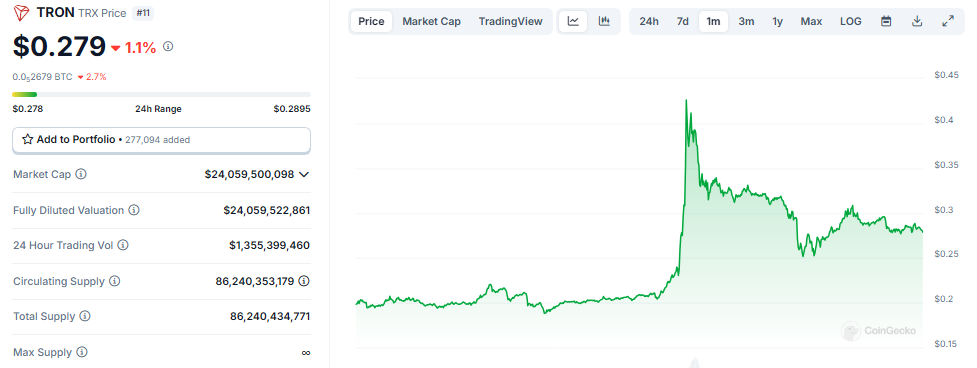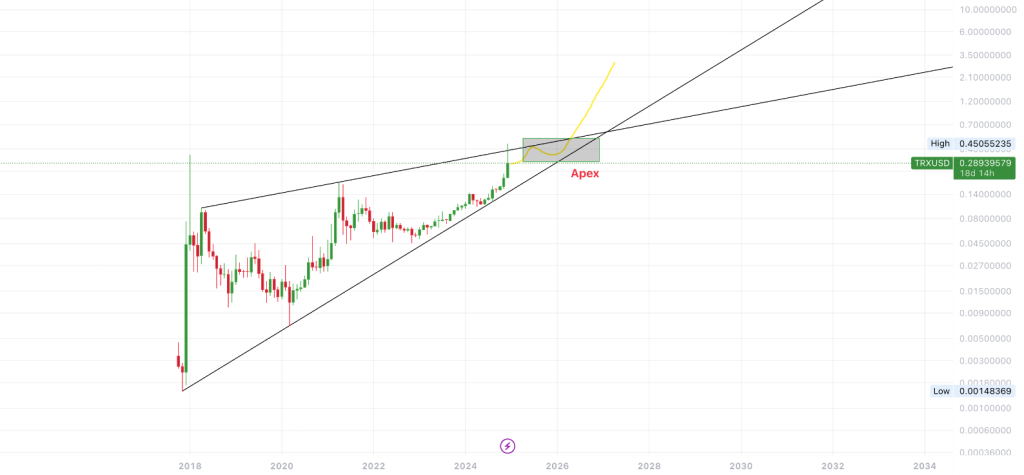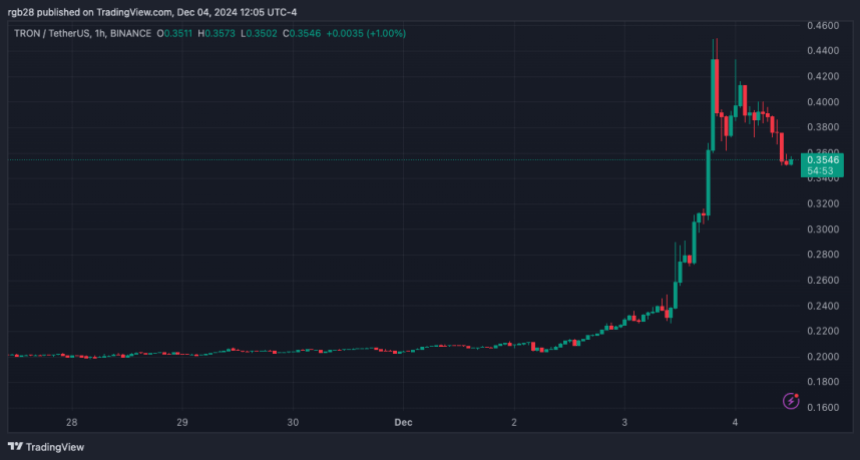Justin Sun walked into the room flanked by his usual entourage of bodyguards and advisers and made his way to the stage. Behind him, a banana was duct taped in position on a white wall. On either side, two blank-faced men in white shirts and black aprons stared into the sea of cameras and smartphones. I wondered what they were thinking.
As for what I was thinking, it was something along the lines of how ridiculous this all was. To give some background, on Nov. 21 Tron founder Justin Sun paid a whopping $6.2 million — including $1 million in commission — at an auction at Sotheby’s in New York for an <a href="https://www.sothebys.com/en/buy/auction/2024/contemporary-evening-auction-2/comedian" target="_blank">artwork called </a><a href="https://www.sothebys.com/en/buy/auction/2024/contemporary-evening-auction-2/comedian" target="_blank">Comedian</a>. The work, created by modern artist Maurizio Cattelan in 2019, is the aforementioned banana duct taped to the wall.
The reaction among many observers was the typical one seen whenever anyone spends a large sum of money on modern art: bewilderment, a bit of disgust, an eye roll. I think people who don’t like art can still appreciate the skill that goes into paintings or sculptures. If works like Comedian or Unmade Bed have any artistic merit, I cannot comprehend it. Tron’s public relations team assured me art is subjective.
But it’s memecoin season and things with absolutely no intrinsic value are very in right now. So it was hardly surprising that shortly after buying the banana-and-duct-tape combo, Sun said he planned to eat it.
This has happened twice before: Once in 2019, when a performance artist took it from the Art Basel in Miami shortly after it was sold for $120,000. Then again by a South Korean art student at the Leeum Museum of Art in Seoul in 2023.
It doesn’t affect the artwork. The banana and duct tape are replaced regularly anyway.
The consumption took place at the 5-star Peninsula Hotel in the Tsim Sha Tsui area of Hong Kong on Friday, a stone’s throw from some of the city’s most notorious doss houses.
The crowd consisted of a mix of journalists and people from the art and crypto industries, Tron and Sotheby’s employees and so-called key opinion leaders (KOLs). I mean the sort of people who wear clothes that look like they came from the local market, but probably cost thousands of dollars — U.S. dollars, not Hong Kong. One fellow journalist had flown all the way from Shanghai just for the event. Around us in the foyer, servers in white suit jackets served wine and other refreshments.
An information board near the entrance said Sun sought to immerse himself in the performance art of Cattelan, with Comedian as his muse. “He envisions this iconic piece as a catalyst for sparking dialogues and exchanges,” the text read.
Other people I spoke to in attendance were more skeptical, characterizing the event as little more than a marketing gimmick.
It’s not the first time Sun has courted the limelight. In 2019, he paid $4.57 million at a charity auction to have lunch with Warren Buffett. In April this year, he commissioned a theme song for Tron written by legendary movie composer Hans Zimmer.
He also served as <a href="https://www.coindesk.com/business/2021/12/17/justin-sun-is-retiring-from-tron-but-not-crypto" target="_blank">Grenada's permanent representative</a> to the World Trade Organization and, more recently, became prime minister of the libertarian <a href="https://liberland.org/about" target="_blank">micronation Liberland</a>, which is located in a floodplain on the Croatian side of the Danube.
Sun has also made the headlines in far less whimsical ways. Last year the U.S. Securities and Exchange Commission <a href="https://www.sec.gov/newsroom/press-releases/2023-59" target="_blank">charged</a> him with fraud and other securities law violations, including “fraudulently manipulating the secondary market for TRX through extensive wash trading.” Sun responded on X that the suit was without merit.
Meanwhile, his lawyers have <a href="https://coingeek.com/justin-sun-tron-threaten-to-sue-coingeek-for-reporting-on-blockchain-terror-ties/" target="_blank">threatened media outlets</a> with legal action when they report on Tron’s use by terrorist groups.
Perhaps the hope was that the banana would bring everyone together and let them forget about this. Indeed, Sun seems to believe the banana is the start of some sort of mass movement. “Is it simply a banana or something belonging to all of us?” he asked at one point.
He compared the process of replacing the banana every few days to the changing Chinese dynasties over the millennia. He praised the banana for how much traffic and attention it had brought himself and Tron. He noted that the banana’s value went beyond the limits of money.
Then he ate it.
November in Hong Kong seems to just be the prime season for odd crypto events. Fortunately, unlike <a href="https://www.coindesk.com/business/2023/11/06/apefest-attendees-report-severe-eye-burn-bayc-says-less-than-1-have-symptoms" target="_blank">ApeFest last November</a>, this time nobody was hospitalized. Instead, upon leaving attendees received a replica of Comedian along with a roll of duct tape and a spare banana.
At least that’s my breakfast tomorrow sorted.






